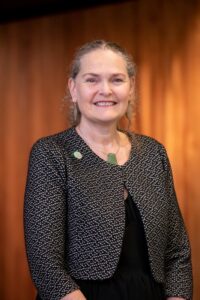Building a Regional Community of DH Practice: Yes We Can!
Librarians have played a key role in the growth and evolution of digital humanities. Libraries and digital humanities share similar values such as openness, participation, collaboration and community. This talk, and discussion afterwards, will explore how we might build on our shared values to grow a strong community of practice in our region between our various sectors such as the GLAM sector and academics working in the creative arts, humanities and social sciences. The talk will explore the challenges and opportunities for digital humanities in the context of the Covid-19 crisis, share how National Library has contributed to digital humanities in the past and how that role could be expanded in the future, and will look ahead to a possible future of greater regional cross-sector collaboration.
The COVID-19 crisis has changed everything in ways we are only beginning to understand. People have been restricted in their physical movements and contacts, so digital experiences, and access to digital information and technical infrastructure have become more important than ever. People’s lives have essentially moved on-line, but there has not been a corresponding increase in the available resources and skills needed to be successful in this new digital world. The rise in importance of digital has exacerbated issues of digital equity, calling for new and creative solutions to providing equitable open access to digital information and virtual events.
What has this meant for the digital humanities? During this time the digital humanities have not received the funding focus given to STEM disciplines. There is now more focus on improving the technical infrastructure that the digital humanities depend on, and more emphasis on open access and online accessibility. And there is clearly a role for the digital humanities to help us understand the impacts of Covid-19 on society. Collaboration and community are now even more important given the resource and skills challenges.
What can National Library and other GLAM institutions do to advance the digital humanities? Over the last decade, National Library has supported digital research in a variety of ways – everything from conducting a facial recognition project using the Library’s digital images, to hosting open datasets online, to contributing to the creation of an open-source GLAM Workbench for web archives. There are however many more ways under exploration within the Library on how the Library could support or participate in digital humanities research. Some of these activities entail scaling up activities GLAM institutions already do, such as building digital collections for research, others would mean establishing new services, requiring additional funding and up-skilling. We think by collaborating with other sectors we could have more meaningful impact in this space. There is a rich and diverse array of individuals and organisations with strengths, resources and/or energy to contribute to building a community of DH practice in our region, including for example, academics, artists, providers of technical infrastructure for digital research, instructors, other GLAM organisations, and funders. What kinds of collaborations would you like to see or would you like to participate in to advance digital humanities in our region?

Rachel Esson
Te Pouhuaki National Librarian
Rachel was appointed to lead the National Library of New Zealand in December 2020.
Prior to taking on the role of National Librarian, Rachel Esson had been Director of Content Services at the National Library of New Zealand, having previously held senior and strategic roles in academic and research libraries, including Associate Chief Librarian Research Collections at the Alexander Turnbull Library.
Rachel is a professionally registered librarian with a Master’s in Library and Information Science (MLIS) from Victoria University, and holds a Certificate in Tertiary Teaching from the University of Otago. She has researched and published on evaluation of library services.
Before joining the National Library in 2012, Rachel was Associate Director, Library Academic Services at Victoria University and Medical Librarian (University of Otago, Wellington). She is a Fellow of the Library and Information Association of New Zealand Aotearoa (LIANZA) and is a past President of the Association.
Rachel is committed to collaboration and to reinvigorating the role of the National Library to support the library sector.